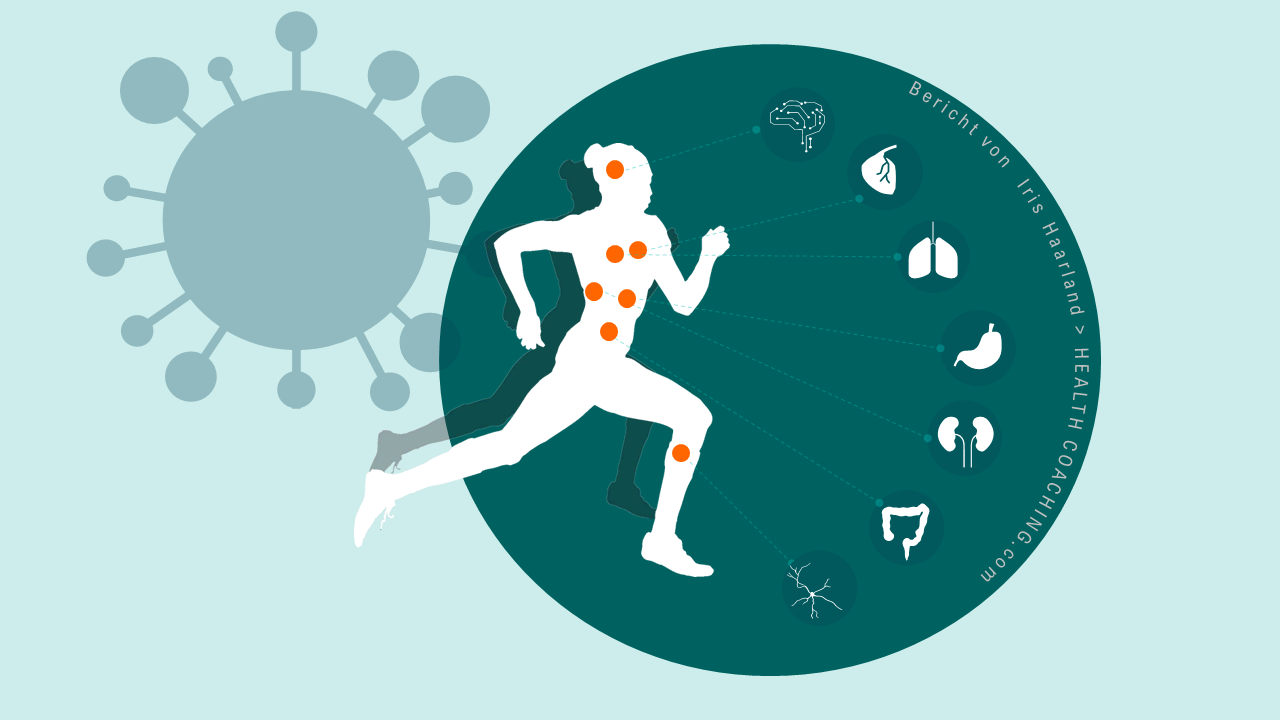The treatment and long-term therapy of post-COVID-19 syndrome, commonly known as long COVID, still has a low priority in the healthcare system. Much more support is needed for those who are no longer able to work due to long COVID. In particular, employees in the healthcare system are in need of help.
by Iris Haarland, HEALTH-COACHING.com (c)
The long-term effects of SARS-CoV-2 infection have been known since 2021 . The symptoms, impairments and organ damages are evident weeks, months and even years after the acute infection. Affected are blood vessels, heart, lungs, pancreas, kidneys, liver, stomach and intestines, and the nervous system. The most common of the 200 symptoms found so far are breathing difficulties, impaired smell and taste, fatigue, headaches, concentration and memory disorders, e.g. word-finding disorders, sleep problems, etc.
According to international studies, a total of 10 percent of the persons with a SARS-CoV-2 infection are suffering from one ore more such symptoms. Now a cohort study from Switzerland, published in May 2023, comes to the following conclusion:
- After 6 months, 23 percent of people with a SARS-CoV-2 infection have not yet fully recovered.
- After 12 months, 18.5 percent of those infected still have symptoms and
- after 24 months, it was still 17.2 percent.
- In 5.2 percent of the people with a SARS-CoV-2 infection, the overall health status even deteriorated. 4.4 percent reported alternating periods of recovery and recurrent phases of disease symptoms.
- After two years or more Long COVID symptoms and consequences are still evident in 18 percent of those who have not been vaccinated.
Especially the situation among nurses and medical staff is tragic. In the Netherlands, 250,676 of nurses between the ages of 18 and 69 had tested positive for SARS-CoV-2 as of January 2022 (as of January 18, 2022, source: RIVM, Rijksinstituut voor Volksgezondheid en Milieu / CBS statline). At least 2000 of these health workers had turned to Dutch trade unions for advice, as they remain unable to work in the long term due to long COVID. They are in desperate need of support
Worldwide there is still an urgent need for research, planning and implementing strategies for prevention, disease management and treatment of the long-term consequences of SARS-CoV-2 infection. Therefore my appeal to political decision-makers in the health system is as follows:
- Primary prevention
|> Well-dosed exercise is one of the best drugs we have at our disposal to improve people’s health status in general. This medication is evidence-based.
|> Because of the broad health effects of sport and exercise, sport and exercise must be an integral part of everyday life.
|> Being able to exercise is a job for each and every one of us, but it is also a task for employers, urban planners and health experts. Make it happen!
- Secondary and tertiary prevention
|> We urgently need to explore the possibilities of secondary and tertiary prevention strategies for the treatment of long Covid. And if we find them, we have to implement them – as fast as possible.
|> Regular medical check-ups and treatment of the long-term effects of Covid-19 infection are essential.
|>Health insurance companies must offer a separate Long COVID check as a preventive service. This must include, among other things, the measurment of the thrombosis values as standard.
The Long COVID initiative of the German Federal Ministry of Health (BMG) in Germany, which was adopted in July 2023, is certainly a significant, important step in the right direction. From 2024, for example, the BMG intends to fund care-related research on Long COVID with EUR 21 million and support additional research projects with EUR 20 million via the Federal Joint Committee. A round table is also intended to promote the exchange of information between those affected and experts.
Also in the Netherlands, the Ministry of Health, Well-being and Sport (VWS) is launching a new centre of excellence for post-Covid research, the „Post-COVID: onderzoeksprogramma, kennisinfrastructuur en expertisenetwerk“ (Post-COVID: Research Programme, Knowledge Infrastructure and Competence Network). The aim of the new program is to improve knowledge and expertise of diagnose, treatment options and the improvement of care for people living with post-COVID. A total of 32.25 million Euro is available for the program until the end of the year 2027.
Initial reactions to the German initiative have been cautious, as the financial resources made available appear to low. Above all, those affected need immediate help. – You can’t wait until the first results of the planned research projects are published before you help those who suffer.
Therefore, systemic and methodological creativity as well as (immediate) initiative are required to improve primary, secondary and tertiary prevention.
Bibliography on the study from Switzerland:
Ballouz, T., Menges, D., Anagnostopoulos, A., Domenghino, A., Aschmann, H. E., Frei, A., Fehr, J.S., Puhan, M.A. (2023). Recovery and symptom trajectories up to two years after SARS-CoV-2 infection: population based, longitudinal cohort study. BMJ 2023: 381:e074425, doi: 10.1136/bmj-2022-074425


